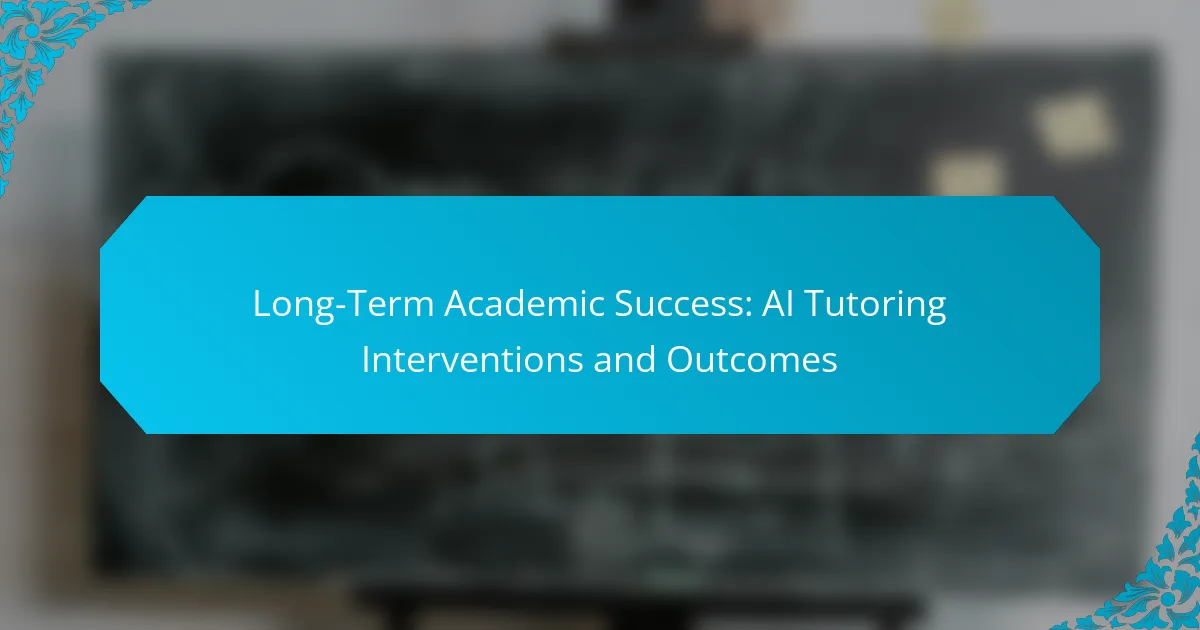Long-term academic success can be significantly enhanced through effective AI tutoring interventions that cater to individual learning needs. By leveraging technology, these programs offer personalized support, immediate feedback, and engaging experiences, ultimately improving student outcomes in areas such as retention and critical thinking.
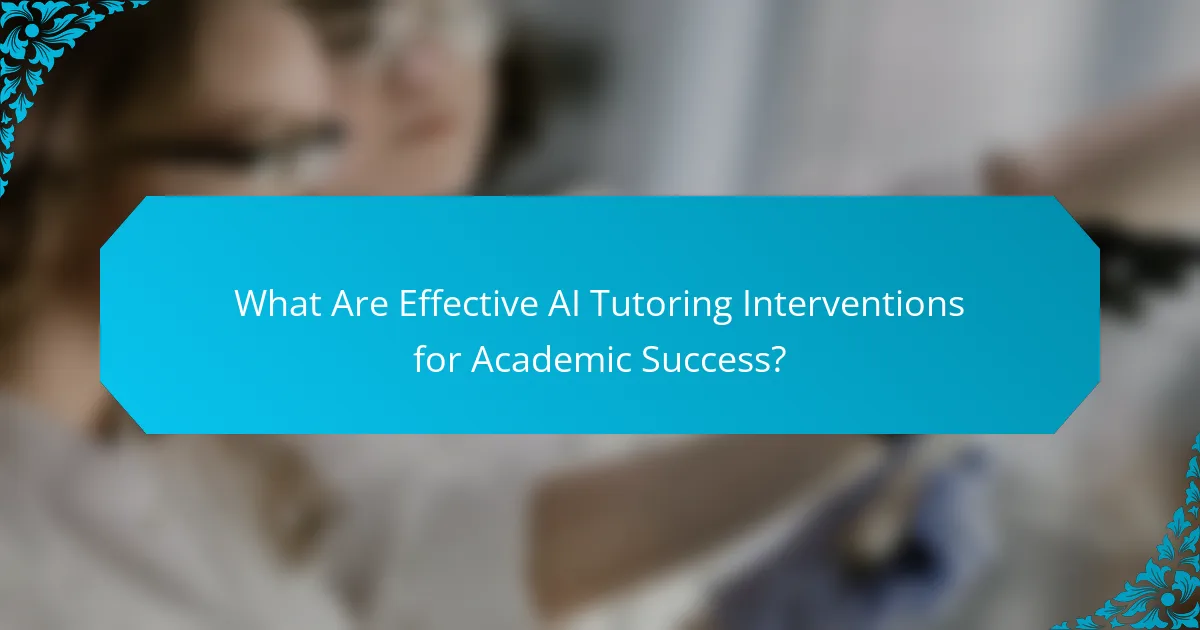
What Are Effective AI Tutoring Interventions for Academic Success?
Effective AI tutoring interventions are tailored strategies that enhance academic performance by addressing individual learning needs. These interventions utilize technology to provide personalized support, immediate feedback, and engaging learning experiences.
Personalized Learning Plans
Personalized learning plans are customized educational strategies designed to meet the unique needs of each student. These plans consider a learner’s strengths, weaknesses, and preferences, allowing for a more targeted approach to education.
To create an effective personalized learning plan, educators can use assessments to identify specific areas where a student may need support. For example, a student struggling with math might receive a plan that focuses on foundational skills before advancing to more complex topics.
Real-Time Feedback Mechanisms
Real-time feedback mechanisms provide immediate responses to students’ actions, helping them understand their performance as they learn. This instant feedback can significantly enhance learning by allowing students to correct mistakes and reinforce concepts on the spot.
For instance, an AI tutoring system might offer instant corrections on a math problem, explaining the error and guiding the student through the correct solution. This approach not only improves understanding but also boosts confidence in the learning process.
Gamified Learning Experiences
Gamified learning experiences incorporate game-like elements into educational content to increase engagement and motivation. By using rewards, challenges, and competition, these experiences make learning more enjoyable and interactive.
Examples include earning points for completing tasks or competing in quizzes against peers. This method can lead to higher retention rates and a more positive attitude towards learning, especially among younger students.
Adaptive Learning Algorithms
Adaptive learning algorithms adjust the difficulty and type of content presented to students based on their performance. These algorithms analyze data to tailor the learning experience, ensuring that students are neither bored with material that is too easy nor overwhelmed by content that is too challenging.
For example, if a student excels in reading comprehension, the algorithm may introduce more complex texts to further challenge them. This personalized approach helps maintain optimal learning conditions and promotes continuous improvement.
Peer Collaboration Tools
Peer collaboration tools facilitate interaction and teamwork among students, enhancing learning through shared experiences. These tools can include discussion forums, group projects, and collaborative platforms that allow students to work together, even remotely.
Encouraging peer collaboration can help students develop critical thinking and communication skills. For instance, a project-based assignment that requires students to collaborate online can lead to deeper understanding and retention of the subject matter, as they learn from each other’s perspectives.
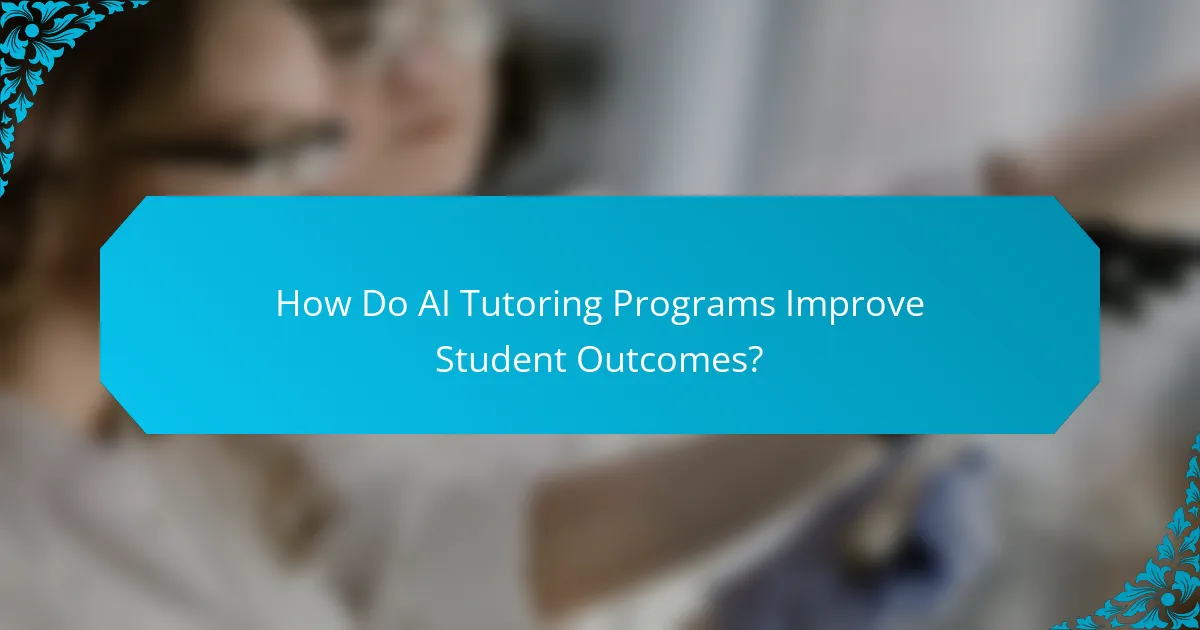
How Do AI Tutoring Programs Improve Student Outcomes?
AI tutoring programs enhance student outcomes by providing personalized learning experiences that adapt to individual needs. These interventions focus on engagement, retention, test performance, and critical thinking, leading to long-term academic success.
Increased Engagement Levels
AI tutoring programs significantly boost student engagement by offering interactive and adaptive learning environments. By tailoring content to match students’ interests and learning styles, these programs keep learners motivated and involved in their education.
For instance, gamified elements in AI tutoring can transform traditional study sessions into enjoyable challenges, encouraging students to participate actively. This heightened engagement often translates into a more positive attitude towards learning.
Higher Retention Rates
Students using AI tutoring tools tend to exhibit higher retention rates of information compared to those relying solely on traditional methods. The personalized feedback and immediate reinforcement provided by AI help solidify knowledge and skills.
Research suggests that when students receive tailored support, they are more likely to remember concepts over time. This is especially beneficial in subjects that require cumulative knowledge, such as mathematics and science.
Improved Test Scores
AI tutoring interventions are associated with improved test scores across various subjects. By identifying and addressing knowledge gaps, these programs help students prepare more effectively for assessments.
For example, students who engage with AI tutoring may see score improvements of 10-30% on standardized tests, as the tools focus on areas needing the most attention. Regular practice with AI can lead to better familiarity with test formats and question types.
Enhanced Critical Thinking Skills
AI tutoring programs foster critical thinking skills by encouraging students to solve complex problems and analyze information. These tools often present scenarios that require higher-order thinking, pushing learners to evaluate and synthesize data.
Through interactive problem-solving tasks, students develop the ability to approach challenges methodically. This skill set is crucial not only for academic success but also for real-world applications in various fields.
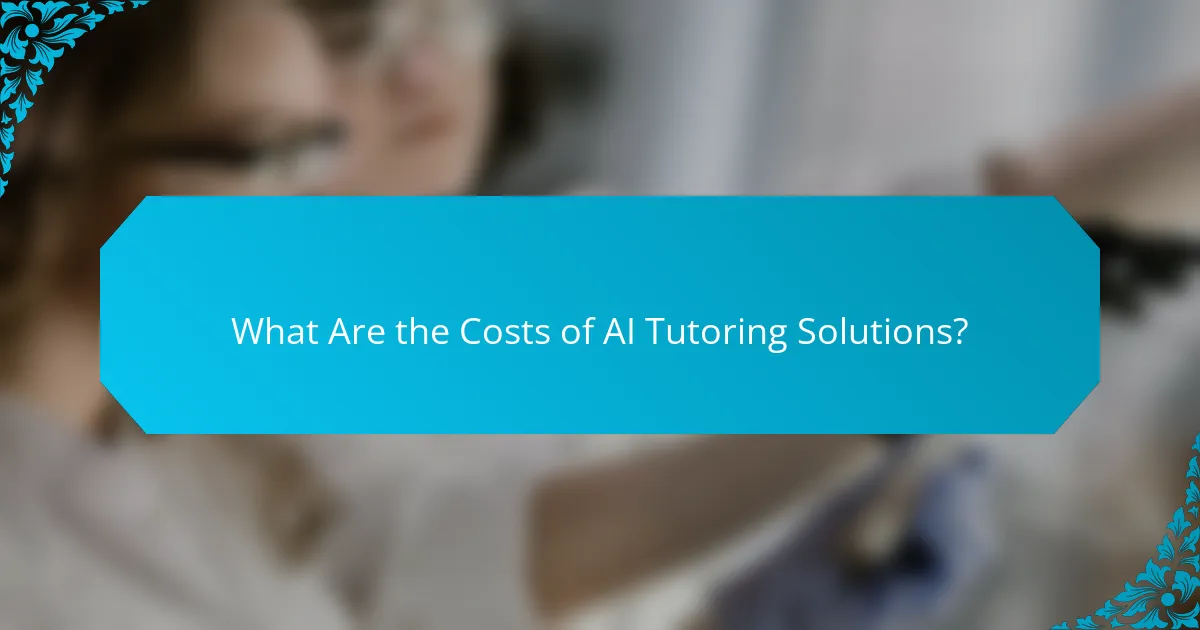
What Are the Costs of AI Tutoring Solutions?
The costs of AI tutoring solutions can vary significantly based on the pricing model chosen, ranging from subscription fees to one-time purchases. Understanding these costs is essential for making an informed decision about which solution best fits your educational needs and budget.
Subscription-Based Pricing Models
Subscription-based pricing models typically charge users a monthly or annual fee for access to AI tutoring services. These fees can range from around $10 to $50 per month, depending on the features offered, such as personalized learning plans or real-time feedback.
When considering a subscription model, evaluate the duration of your need for tutoring. Long-term users may benefit from annual plans that often come with discounts, while short-term users might prefer monthly subscriptions to avoid unnecessary costs.
One-Time Purchase Options
One-time purchase options allow users to buy access to specific AI tutoring programs or courses without ongoing fees. Prices for these options can vary widely, typically falling between $50 and $300, depending on the depth and breadth of the material provided.
These options are ideal for learners who want to target specific skills or subjects without committing to a long-term subscription. However, ensure that the content is comprehensive enough to meet your learning objectives before making a purchase.
Free Trials and Discounts
Many AI tutoring platforms offer free trials or introductory discounts to attract new users. These trials usually last from a week to a month and provide full access to the service, allowing you to assess its effectiveness without financial commitment.
Take advantage of these offers to evaluate different platforms. Look for discounts on subscriptions or one-time purchases, especially during back-to-school seasons or promotional events, which can significantly reduce costs.
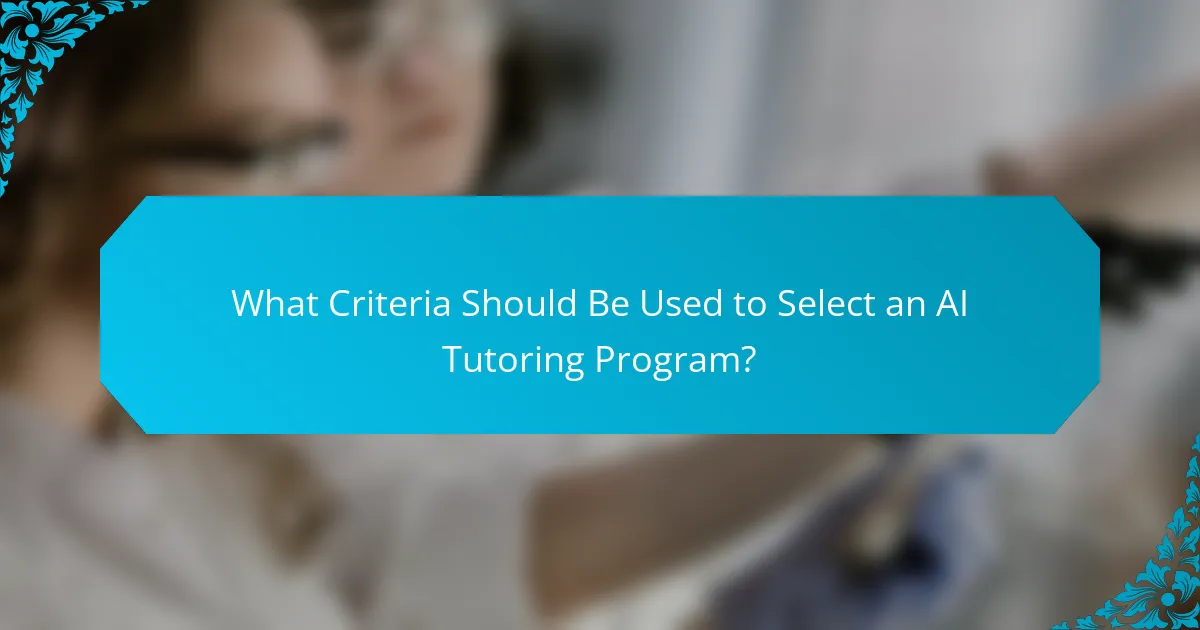
What Criteria Should Be Used to Select an AI Tutoring Program?
Selecting an AI tutoring program requires careful consideration of several key criteria to ensure it effectively meets educational goals. Focus on curriculum alignment, user interface, and the availability of support and resources to maximize the program’s impact on long-term academic success.
Curriculum Alignment
Curriculum alignment is essential for ensuring that the AI tutoring program complements what students are learning in their classrooms. Look for programs that adhere to local educational standards and frameworks, such as the Common Core in the United States or national curricula in Europe.
Evaluate whether the content is tailored to specific subjects and grade levels. Programs should provide materials that reinforce classroom learning, offering practice that mirrors school assignments and assessments.
User Interface and Experience
A user-friendly interface is crucial for student engagement and effective learning. The AI tutoring program should be intuitive, allowing students to navigate easily without frustration. Features like clear instructions, interactive elements, and responsive design enhance the learning experience.
Consider the accessibility of the program across devices. A good AI tutoring platform should work seamlessly on computers, tablets, and smartphones, ensuring students can learn anytime and anywhere.
Support and Resources Availability
Support and resources are vital for maximizing the benefits of an AI tutoring program. Check if the program offers comprehensive resources such as tutorials, FAQs, and customer support to assist users with technical issues or learning challenges.
Additionally, consider the availability of supplementary materials, such as practice exercises and progress tracking tools. These resources can help students stay motivated and informed about their learning journey.
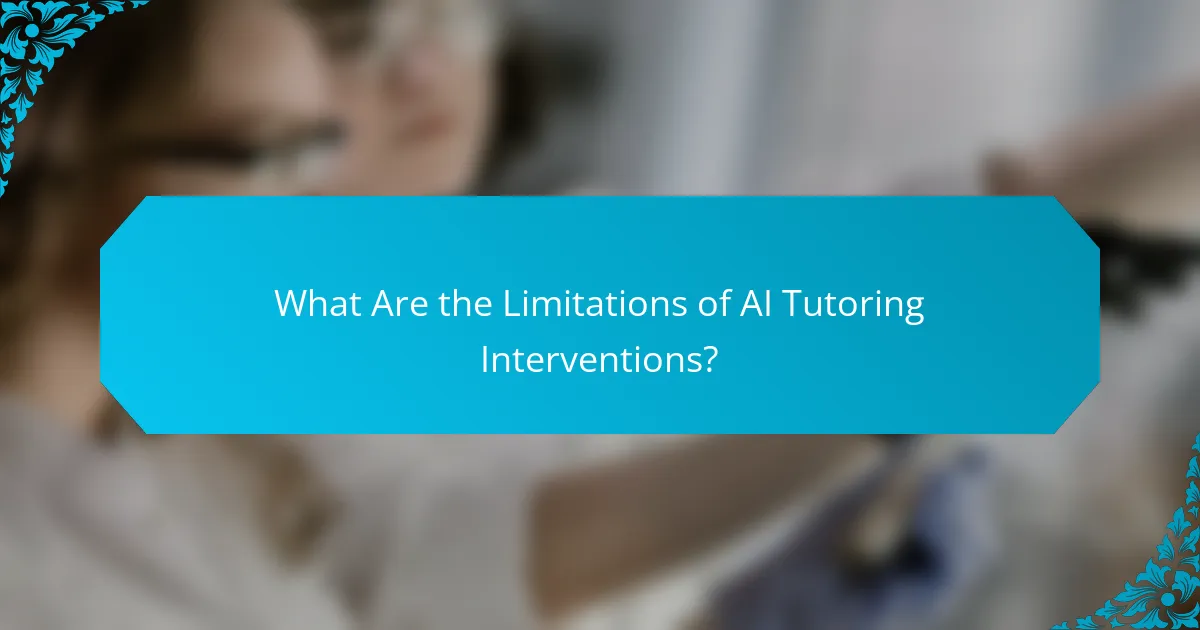
What Are the Limitations of AI Tutoring Interventions?
AI tutoring interventions have several limitations that can impact their effectiveness. Key issues include a lack of human interaction and concerns regarding data privacy, which can affect student engagement and trust in the technology.
Lack of Human Interaction
AI tutoring systems often lack the personal touch that human tutors provide, which can hinder student motivation and emotional support. While AI can offer personalized learning paths, it cannot replicate the empathy and understanding that come from human interaction.
Students may struggle with complex emotional or social cues that a human tutor would typically address. For instance, a student feeling frustrated may benefit from a tutor’s encouragement, something an AI may not effectively convey.
Data Privacy Concerns
Data privacy is a significant concern with AI tutoring interventions, as these systems often collect sensitive information about students. Parents and educators may worry about how this data is stored, used, and shared, potentially leading to reluctance in adopting such technologies.
Regulations like the General Data Protection Regulation (GDPR) in Europe mandate strict guidelines for data handling, which AI tutoring platforms must comply with. Ensuring transparency about data usage and implementing robust security measures are essential to build trust among users.
